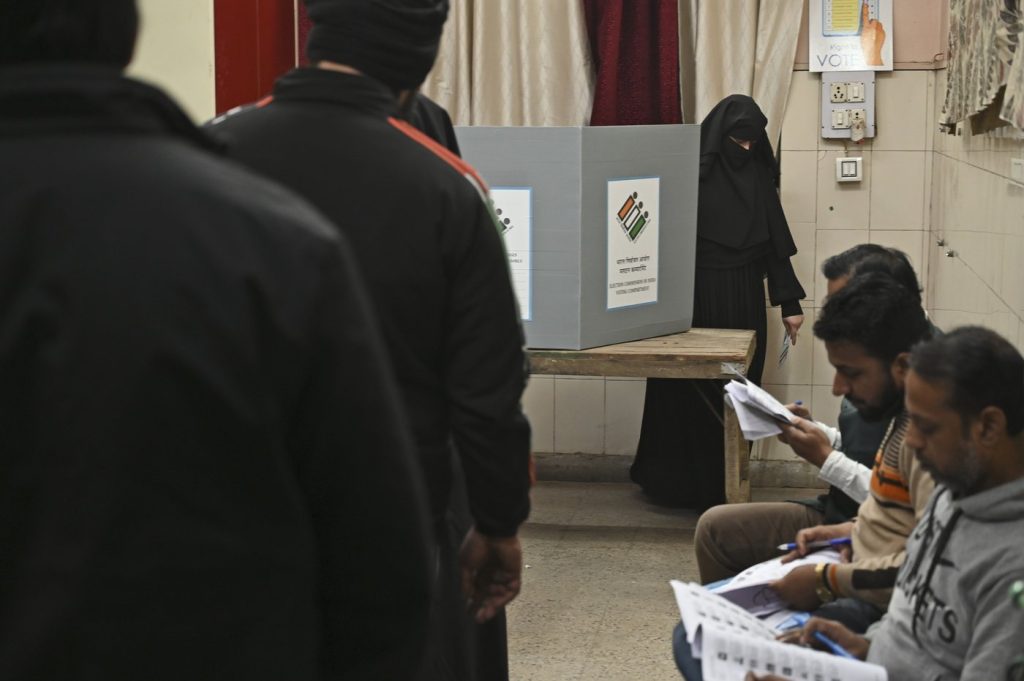NEW DELHI (AP) – On Wednesday, thousands of voters began participating in the state legislature elections in New Delhi, where Prime Minister Narendra Modi's Bharatiya Janata Party (BJP) is aiming to unseat the Aam Aadmi Party (AAP), which has held power in the Indian capital for over a decade. The elections are significant as they come after a period of intense political maneuvering and allegations of corruption.
The day started on a cold, wintry morning as voters flocked to polling booths across the sprawling capital. Key figures from the AAP, including prominent leader Manish Sisodia, engaged in spiritual rituals, offering prayers in a temple before casting their votes, emphasizing their party's grassroots approach and connection to the public.
Modi's BJP faces off against the AAP, led by Arvind Kejriwal, a popular figure known for anti-corruption activism and a focus on welfare policies. Despite the AAP's successes in past elections, where it won 62 out of 70 seats in the 2020 election, they are currently grappling with allegations of graft that have challenged Kejriwal’s reputation as a clean leader. The BJP managed to secure only eight seats in that election, while the Congress party was left with none.
Both Modi and Kejriwal have campaigned vigorously, engaging in roadshows and rallies that attracted thousands of supporters. They have promised improvements in government schools, free health services, electricity provisions, and a monthly stipend for economically weaker women, aiming to rally voters around social welfare issues.
Voting is set to conclude later on Wednesday, with results anticipated on Saturday. Over 15 million residents of New Delhi are eligible to participate in the electoral process. Political analysts are predicting a tightly contested race, noting a shift from the previous one-sided matches where the AAP enjoyed overwhelming support.
Delhi, a metropolitan area exceeding 20 million residents, has seen the BJP struggle to secure power for more than 27 years, despite having a considerable support base. Recent graft allegations against Kejriwal and other AAP leaders, particularly stemming from a controversial liquor license case, have raised doubts among voters and impacted the party's standing.
The liquor policy scenario has been detrimental for Kejriwal, diminishing his previously untarnished image. He and other AAP leaders, who firmly deny the allegations—claiming they are politically motivated—were arrested last year on bribe-related charges. Following rigorous legal battles, the Supreme Court granted them bail, reinstating some of their political standing.
After stepping down from the chief minister's position, Kejriwal's authority has been challenged, prompting a re-evaluation of the AAP's strategies ahead of this election cycle. Contrarily, the BJP has made a strategic comeback, winning two state elections in northern Haryana and western Maharashtra since their loss in the 2020 New Delhi elections.
The BJP anticipates that recent reductions in income taxes for the salaried middle class will work in their favor, aiming to consolidate support from this critical voter demographic. Meanwhile, opposition parties have raised alarms over the tactics employed by the BJP, alleging misuse of federal investigative agencies to undermine their rivals, as seen in the numerous raids and corruption inquiries into major opposition figures leading up to these elections.
Kejriwal, who founded the AAP in 2012 amidst a widespread public outcry against the Congress party's corruption scandals, has centered his party's platform around anti-corruption and pro-poor policies, focusing on educational reforms, affordable utilities, and transportation support for women. This electoral battle marks a crucial moment for both parties as they navigate their respective political challenges in the dynamic landscape of Indian politics.
By Ashok Sharma, The Associated Press










